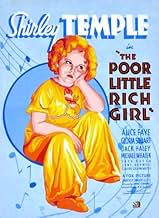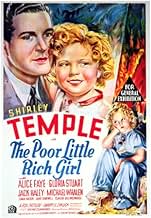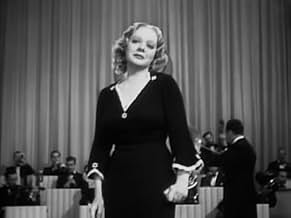The daughter of a wealthy businessman becomes lost in the city while traveling to a new school, and is taken in by a pair of down-on-their-luck performers.The daughter of a wealthy businessman becomes lost in the city while traveling to a new school, and is taken in by a pair of down-on-their-luck performers.The daughter of a wealthy businessman becomes lost in the city while traveling to a new school, and is taken in by a pair of down-on-their-luck performers.
- Awards
- 2 wins total
- Policeman
- (uncredited)
- Radio Station Receptionist
- (uncredited)
- Waiter
- (uncredited)
Featured reviews
It didn't have as much tap dancing as I would like to have seen, but it did feature a prolonged dance at the end with Shirley, Jack Haley and Alice Faye.
The villain was some mysterious dude who was either a child molester or a kidnapper. It was never really explained. Thankfully, he had a small role. Otherwise, it was all good people and fun ones to watch. I like seeing Gloria Stuart in her early days, too.
The story is predictable, but most of them are and everyone winds up happy in the end. I find nothing wrong with that! It's all the better that Shirley winds up with vaudeville performers, guaranteeing we get a lot of musical entertainment in this movie. And.....where else but a Shirley Temple movie, would you have a song called "You've Got To Eat Your Spinach, Baby?"
The performances are right up there. One of my favourite screen stars Alice Faye is so brilliant, she never gets lost in Temple's glare as do so many of her costars. Jack Haley is hilarious, and the songs are amazing. Alas, Gloria Stuart isn't given much to do but she looks wonderful.
Favourite moments include the spaghetti-eating scene, Shirley's conversation with the curb-side porter and of course "You Gotta Eat Your Spinach Baby." Fine film for parents to watch with their kids.
Try to get the original black and white version if you can, the colorized version looks a little weird.
When her nanny is struck in a hit-and-run at the train station, little Barbara strikes on her own to meet friends. After spending a day with an Italian organ grinder and his colorful family, Barbara joins up with Jack Haley and Alice Faye as down-on-their-luck married singers Dolan and Dolan. Adopting the identity of her favorite book character, Barbara tells the Dolans that she is runaway orphan Betsy Weer. Soon she is given another alias: Pretending to be the Dolan daughter, Bonny Dolan, Barbara turns their failing act around, and the trio is hired to advertise for the Peck Soap Company, the arch rival of Barbara's father's soap brand.
As Bonny, Barbara wins the hearts of all her audiences, until her father hears her voice singing on the radio. Mr. Barry finds his daughter just in time to save her from a mysterious stalker who has been following the young girl around throughout the entire movie, always accompanied by eerie orchestral music. In one scene, he peers through a window and watches Barbara sleeping, and in another, he tries to lure her away with the promise to buy her candy. What's even more disturbing is that the movie never says exactly what this creep wants with Barbara. The fate of Barbara's nanny is never revealed either; she is simply whisked away to a hospital after the car collision and is not seen or mentioned again.
Despite these two loose ends, Poor Little Rich Girl is a perfect example of the standard Temple story. All ingredients for a Shirley smash are here: long tap-dance numbers (Shirley's dance-off with Jack Haley will knock your socks off), lots of cute songs (particularly enjoyable are "Oh My Goodness" and "You've Gotta Eat Your Spinach, Baby"), a cranky curmudgeon who warms his heart to Shirley (in "Poor Little Rich Girl," it's Mr. Peck, but see Ned Smith in "Bright Eyes," Colonel Lloyd in "The Little Colonel," or Lord Wickham in "The Little Princess," for other examples), and a happy ending. Her story lines may seem trite and repetitive now, but they were what the nation wanted to see in the 1930s, when Shirley Temple was one of the biggest stars in the world and a guaranteed box office smash. Shirley was obviously enjoying the height of fame at the time of this movie, as one song, "But Definitely," makes a reference to two of her most famous songs, "The Good Ship Lollipop" and "Animal Crackers in My Soup."
Shirley Temple is in top form in this winning film which gives her ample opportunity to display her many charms. She lights up the screen with her youthful joy. It's no wonder she was Hollywood's biggest star for several years.
Shirley is given fine support from Jack Haley & Alice Faye as her musical partners, and Michael Whalen & Gloria Stuart as her father & his new lady love. Claude Gillingwater is very good as the crotchety business rival who is melted by Shirley's affection. That's Jane Darwell as Shirley's nanny & Henry Armetta scores as an Italian organ grinder. Film mavens should keep an eye out for Billy Gilbert, in a tiny bit as a hilarious waiter.
Shirley sings `Oh, My Goodness', `When I'm With You' & `But Definitely' and joins with Faye & Haley in `You Gotta Eat Your Spinach, Baby' & "Military Man".
Did you know
- TriviaThe precision tap dance performed by Jack Haley, Alice Faye and Shirley Temple required endless takes. Although Haley, Faye and Temple were all excellent tap dancers, they found it extremely difficult to stay in sync for such a long and complicated number.
- GoofsIn the end credits, actress Sara Haden's first name is misspelled as "Sarah."
- Quotes
Stebbins: That's the third sneeze.
Collins: I'm afraid you'll have to go to bed.
Barbara Barry: But I'm not sick. I feel fine!
Woodward: Oh, Collins, she's perfectly well. A sneeze is nothing to be alarmed at.
Collins: Maybe so, But I'm responsible for the child. Come along, dear.
Woodward: The child sneezes, and you'd think the world has come to an end. Why can't they leave her alone? She's a perfectly normal, healthy child. The way they carried on here, you'd think she was made of glass! Something ought to be done.
Collins: How Mr. Barry can stand that woman is beyond me.
Woodward: You can't expect a widower and a man as busy as Mr. Barry to notice everything that goes on in the house.
- ConnectionsFeatured in Biography: Darryl F. Zanuck: 20th Century Filmmaker (1995)
- SoundtracksWhen I'm with You
(1936) (uncredited)
Music by Harry Revel
Lyrics by Mack Gordon
Played during the opening credits
Sung by Tony Martin
Later Sung by Shirley Temple
Finally Sung by Alice Faye
- How long is Poor Little Rich Girl?Powered by Alexa
Details
- Release date
- Country of origin
- Languages
- Also known as
- Pauvre petite fille riche
- Filming locations
- Production company
- See more company credits at IMDbPro
- Runtime1 hour 19 minutes
- Color
- Aspect ratio
- 1.37 : 1
Contribute to this page








































